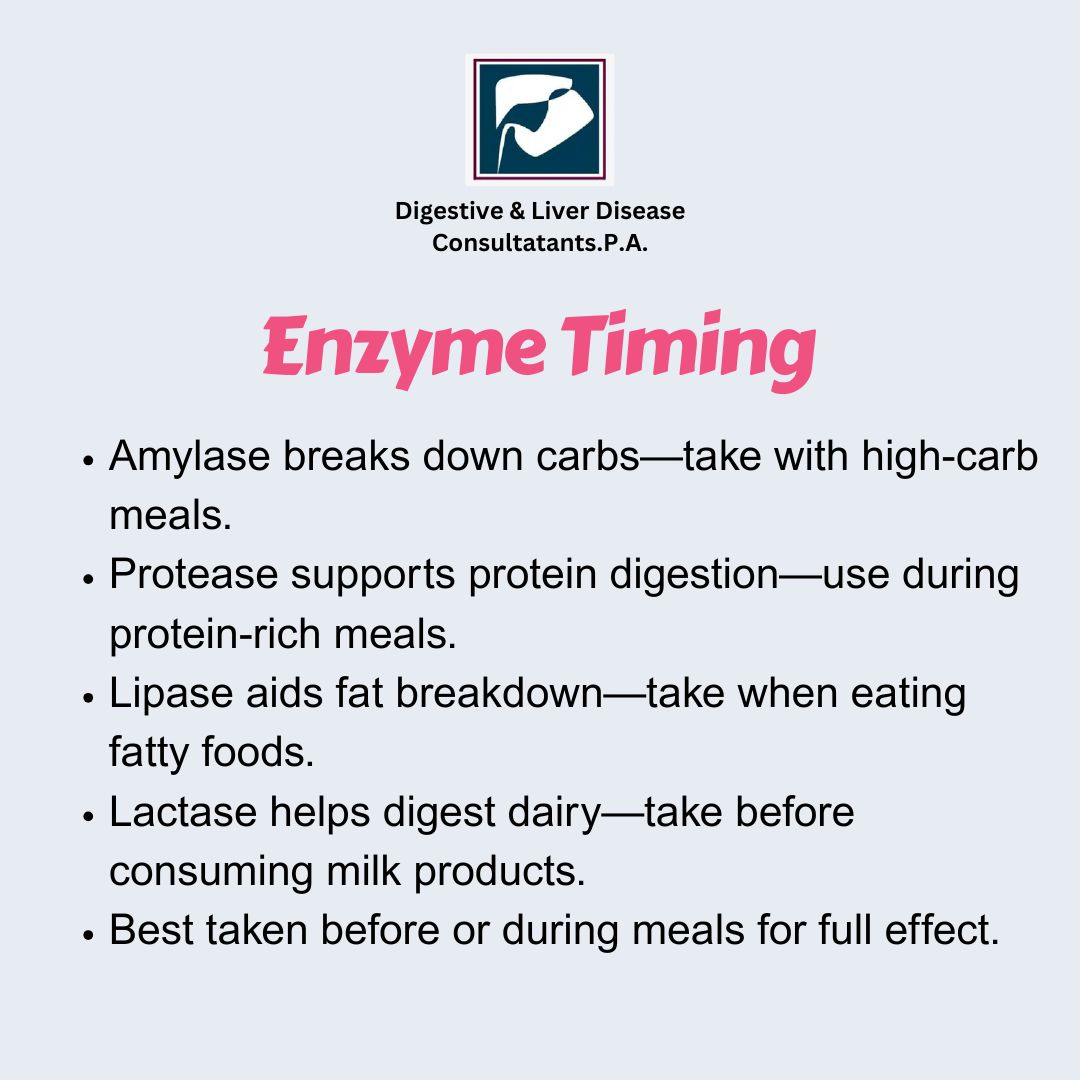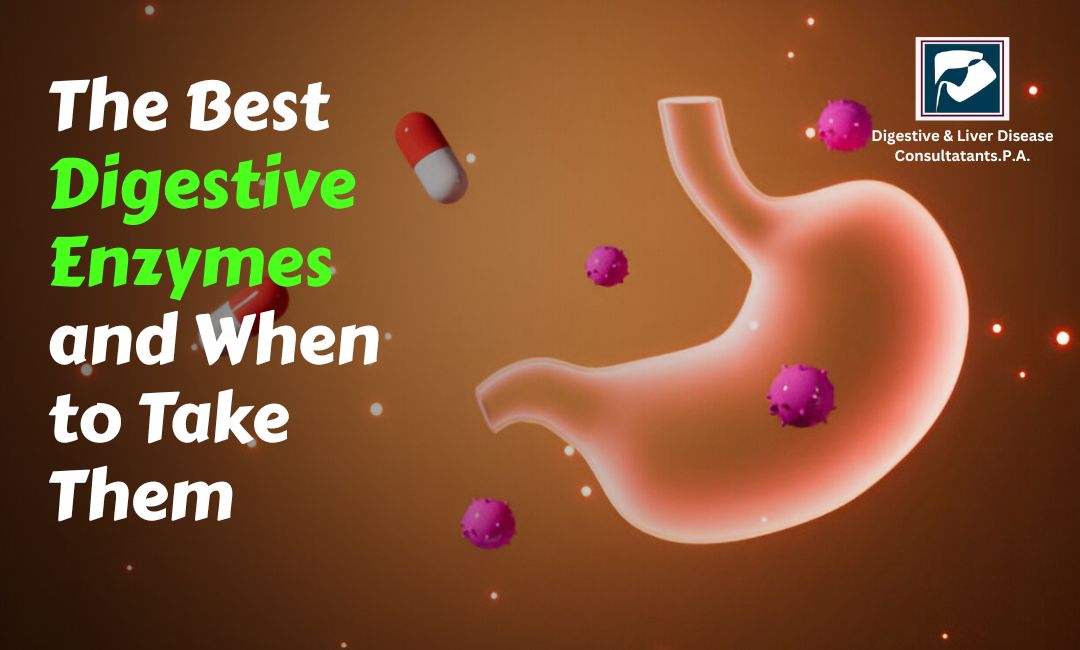Digestive enzymes play a powerful yet often overlooked role in your digestive system. They help break down the food you eat into smaller nutrients your body can absorb and use for energy, growth, and repair. When your body doesn’t produce enough digestive enzymes or they aren’t working properly, it can lead to bloating, gas, indigestion, and other digestive issues.
In this blog, we’ll explain what digestive enzymes are, how they work, when you should consider taking them, and which enzymes are the most beneficial. At Digestive & Liver Disease Consultants, P.A., we are committed to helping you understand your digestive health and feel your best every day.
What Are Digestive Enzymes?
Digestive enzymes are natural substances produced by the body, mainly in the salivary glands, stomach, pancreas, and small intestine. Their job is to break down large molecules of food into smaller ones so your body can absorb nutrients like proteins, fats, and carbohydrates effectively.
Here are the main types of digestive enzymes your body makes:
Amylase: Breaks down carbohydrates (starches) into sugars.
Protease (or pepsin): Breaks down proteins into amino acids.
Lipase: Breaks down fats into fatty acids and glycerol.
Lactase: Helps digest lactose, the sugar in milk and dairy products.
Maltase and sucrase: Break down specific sugars found in foods and drinks.
Some people don’t produce enough of these enzymes, either due to genetics, age, or underlying digestive conditions. This can lead to digestive discomfort and poor nutrient absorption.

Who May Need Digestive Enzyme Supplements?
While most people produce enough digestive enzymes naturally, certain health issues can reduce enzyme production. You may benefit from enzyme supplements if you experience:
- Chronic bloating or gas after eating
- Frequent indigestion
- Unexplained weight loss
- Fatigue or weakness (due to nutrient malabsorption)
- Fatty, greasy, or floating stools
Diagnosed digestive disorders like:
- Lactose intolerance
- Pancreatitis
- Irritable Bowel Syndrome (IBS)
- Celiac disease
- Crohn’s disease
- Cystic fibrosis
The Best Digestive Enzymes to Look For
Not all enzyme supplements are the same. The best choice depends on your specific needs and symptoms. Here are some of the most commonly recommended digestive enzymes and how they can help:
1. Amylase
Function: Breaks down complex carbohydrates (like potatoes, bread, and rice) into simple sugars.
Ideal for: People who feel bloated after eating starchy meals.
2. Protease
Function: Helps digest proteins found in meat, eggs, dairy, and legumes.
Ideal for: People who feel heavy or sluggish after eating protein-rich meals.
3. Lipase
Function: Breaks down fats into fatty acids.
Ideal for: People with difficulty digesting high-fat meals or with gallbladder issues.
4. Lactase
Function: Helps digest lactose, the sugar found in milk and dairy.
Ideal for: People who are lactose intolerant.
5. Cellulase
Function: Breaks down fiber from fruits and vegetables (which humans can’t digest naturally).
Ideal for: People with gas or bloating from high-fiber foods.
6. Pancreatin
Function: A blend of amylase, lipase, and protease—similar to enzymes produced by the pancreas.
Ideal for: People with pancreatic insufficiency or chronic pancreatitis.
7. Bromelain and Papain
Function: Natural enzymes found in pineapple and papaya, respectively, which help digest protein.
Ideal for: Mild digestive support and reducing inflammation.
When Should You Take Digestive Enzymes?
Timing matters when it comes to digestive enzymes. To get the best results, you should take them:
Just before or with your meals – This ensures the enzymes are present in your stomach as food arrives.
With your largest meals – Especially if those meals contain fats, protein, or carbs that typically cause issues.
Not on an empty stomach – Unless advised by a doctor for specific enzymes like bromelain used for inflammation.
Are Digestive Enzyme Supplements Safe?
For most people, digestive enzyme supplements are safe and well-tolerated when taken as directed. However, they may cause side effects like nausea, diarrhea, or abdominal cramps in some individuals. People with allergies to specific ingredients (e.g., pork-based enzymes or plant-based enzymes) should choose supplements carefully.
Always consult a doctor before starting digestive enzyme supplements, especially if you have a chronic medical condition or are taking other medications.
Nutrition Tips to Naturally Support Digestive Enzyme Production
In addition to supplements, certain foods and habits can help support your body’s natural enzyme production:
Eat raw fruits and vegetables – Especially pineapple, papaya, mango, and avocado.
Chew your food thoroughly – Digestion begins in the mouth!
Stay hydrated – Water supports digestive function.
Avoid overeating – It stresses your digestive system.
Limit highly processed foods – These are hard to digest and lack natural enzymes.
How Digestive & Liver Disease Consultants, P.A. Can Help
At Digestive & Liver Disease Consultants, P.A., we specialize in diagnosing and treating a wide range of digestive disorders—from minor issues like gas and bloating to complex conditions like pancreatic insufficiency or chronic liver disease.
Our team of expert gastroenterologists uses advanced tools to identify enzyme deficiencies and recommend the right treatments, including dietary adjustments, supplements, and long-term care plans. Whether you need guidance on enzyme therapy or support for managing chronic digestive conditions, we're here to help you feel your best again.
We believe that informed patients make better health decisions. That’s why we take the time to explain your condition and treatment options in simple, clear language.
Conclusion
Digestive enzymes are essential for good gut health. When your body doesn’t produce enough of them—or when digestion becomes challenging due to illness—supplementing with the right enzymes can make a big difference. From improving nutrient absorption to reducing bloating and discomfort, these powerful tools can restore balance to your digestive system.
Struggling with digestion? Visit Digestive & Liver Disease Consultants, P.A., to consult our best gastroenterologist for enzyme advice and gut health care.






